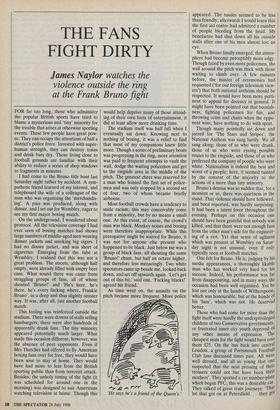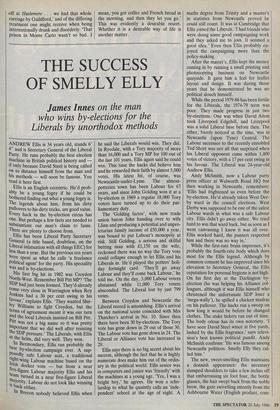THE FANS FIGHT DIRTY
James Naylor watches the violence outside the ring at the Frank Bruno fight
FOR far too long, those who administer the popular British sports have tried to blame a mysterious and `tiny' minority for the trouble that arises at otherwise sporting events. These few people have great pow- er. They can occupy the attentions of half a district's police force. Invested with super- human strength, they can destroy trains and drink bars dry. Those living close to football grounds are familiar with their ability to reduce a series of shop windows to fragments in minutes.
I had come to the Bruno title bout last Saturday night rather by accident. A sym- pathetic friend learned of my interest, and telephoned the wife of a colleague of the man who was organising the 'merchandis- ing'. A pass was produced, along with dinner, and I set out for Wembley, eager to see my first major boxing match.
On the underground, I wondered about protocol. All the television coverage I had ever seen of boxing matches had shown large numbers of middle-aged men wearing dinner jackets and smoking big cigars. I had no dinner jacket, and was short of cigarettes. Emerging from the tube at Wembley, I realised that this was not a great problem. The streets, although half empty, were already filled with empty beer cans. What sound there was came from straggling groups of fans, all of whom shouted 'Bruno!' and `He's here, he's there, he's every fucking where, Frankie Bruno', in a deep and thus slightly sinister way. It was, after all, just another football match.
This feeling was reinforced outside the stadium. There were dozens of stalls selling hamburgers; there were also hundreds of apparently drunk fans. The tiny minority appeared potentially much larger. What made this occasion different, however, was the absence of peer opponents. Even if Mrs Thatcher had offered to fly American boxing fans over for free, they would have been wise to stay at home. They would have had more to fear from the British sporting public than from terrorist attack. Besides, the unholy timing of the fight (it was scheduled for around one in the morning) was designed to suit Americans watching television at home. Though this would help deprive many of those attend- ing of their own form of entertainment, it did at least allow more drinking time.
The stadium itself was half full when I eventually sat down. Knowing next to nothing of boxing, it was a relief to find that most of my companions knew little more. Though a series of preliminary bouts was progressing in the ring, more attention was paid to frequent attempts to vault the wall, dodge the waiting policemen and get to the ringside area in the middle of the pitch. The greatest cheer was reserved for a man who feinted the first set of police- men and was only stopped by a second set of four, two of whom became briefly airborne.
Most football crowds have a tendency to snide racism; this may conceivably come from a minority, but by no means a small one. At this event, of course, the crowd's man was black. Monkey noises and booing were therefore inappropriate. While this prerogative might be waived for Bruno, it was not for anyone else present who happened to be black. Just below me was a group of black fans, all shouting the same `Bruno!' chant, but half an octave higher, and therefore less menacingly. Two white spectators came up beside me, looked back down, and set off upwards again. `Let's get out of this bit,' said one. 'Fucking blacks!' agreed his friend.
As time went on, the assaults on the pitch became more frequent. More police `He says he's a friend of the Queen's.' appeared. The tussles seemed to be less than friendly; afterwards I would learn that the first aid centre had admitted a number of people bleeding from the head. My benefactor had shut down all his outside stalls after one of his men almost lost an eye.
When Bruno finally emerged, the atmos- phere had become perceptibly more edgy. Though faced by even more policemen, the wall around the pitch was thick with those waiting to climb over. A few minutes before, the master of ceremonies had requested (`for our foreign television view- ers') that both national anthems should be respected. It would have been more perti- nent to appeal for decency in general. It might have been pointed out that boorish- ness, fighting policemen for fun, and throwing coins and chairs when the oppo- nent wins, have nothing to do with sport.
Though many pointedly sat down and jeered for 'The Stars and Stripes', the National Anthem was sung lustily. We all sang along: those of us who were drunk, those of us who were eyeing possible routes to the ringside, and those of us who preferred the company of people who were white. Nationalism is indeed the best and worst of a people; here, it seemed tainted by the consent of the majority to the actions of a more than tiny minority.
Bruno's demise was so sudden that, for a moment or so, there was quietness in the stand. That violence should have followed, and been reported, was hardly surprising. It had been a latent force throughout the evening. Perhaps on this occasion one should have been grateful that nobody was killed, and that there were not enough fans from the other man's side for the engineer- ing of a riot. Yet that sense of ugliness which was present at Wembley on Satur- day night is not unusual, even if only typically seen at football matches. One felt for Bruno. He is, judging by his media appearances, a thoroughly likable man who has worked very hard for his success. Indeed, his performance was far from disappointing, and in many ways the occasion had been well organised. Yet he lost not only at the hands of Witherspoon, which was honourable, but at the hands of his 'fans', which was not. He deserved better.
Those who had come for more than the fight itself were hardly the underprivileged children of two Conservative governments, or frustrated inner city youth deprived of any other means of expression. The cheapest seats for the fight would have cost them £25. On the bus back into central London, a group of Portsmouth Football Club fans discussed times past. All were well dressed, and all so young that 011.e suspected that the neat pressing of thetr trousers could not but have been their mothers'. They spotted a car number-plate which began PFC; this was a desirable car. They talked of great train journeys: `That, lot that got on at Petersfield. . . they 801 off at Haslernere . . we had that whole carriage by Guildford,' and of the differing treatment one might receive when being internationally drunk and disorderly: 'That prison in Monte Carlo wasn't so bad. I mean, you got coffee and French bread in the morning, and then they let you go.' This was evidently a desirable resort. Whether it is a desirable way of life is another matter.



















































 Previous page
Previous page